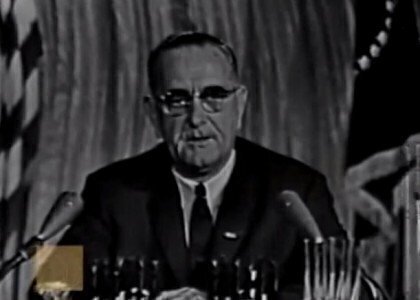On July 2, 1964, President Lyndon Johnson signed the Civil Rights Act. The landmark law was a turning point in American history, as it addressed discrimination and segregation on a national level.
 Link: See the Civil Rights Act
Link: See the Civil Rights Act
The act’s opening paragraph started the end of a struggle over civil rights, federal power and the Constitution that began in the Civil War’s aftermath.
“To enforce the constitutional right to vote, to confer jurisdiction upon the district courts of the United States to provide injunctive relief against discrimination in public accommodations, to authorize the Attorney General to institute suits to protect constitutional rights in public facilities and public education, to extend the Commission on Civil Rights, to prevent discrimination in federally assisted programs, to establish a Commission on Equal Employment Opportunity, and for other purposes,” the paragraph read.
President Johnson, in a dramatic moment, addressed the nation about what appeared to be a turning point in American history.
Link: Johnson’s remarks | Video of Johnson’s speech
“We believe that all men are entitled to the blessings of liberty. Yet millions are being deprived of those blessings—not because of their own failures, but because of the color of their skin,” Johnson said.
“The reasons are deeply imbedded in history and tradition and the nature of man. We can understand—without rancor or hatred—how this all happened. But it cannot continue. Our Constitution, the foundation of our Republic, forbids it. The principles of our freedom forbid it. Morality forbids it. And the law I will sign tonight forbids it.”
Johnson’s powerful remarks ended with a call for unity.
“Let us close the springs of racial poison. Let us pray for wise and understanding hearts. Let us lay aside irrelevant differences and make our Nation whole. Let us hasten that day when our unmeasured strength and our unbounded spirit will be free to do the great works ordained for this Nation by the just and wise God who is the Father of us all,” he said.
The Civil Rights Act had been before Congress, in several forms, since the late 1950s.
A turning point happened in March 1964, when a group of Southern senators started a record-setting filibuster in March.
No full-featured Civil Rights Act proposal had ever survived a filibuster attempt on the Senate floor.
A year earlier, President John F. Kennedy told a nationwide audience that the act was a necessity. A prior bill, the Civil Rights Act of 1957, was important but it had a limited impact and it was difficult to enforce. It also had survived a 24-hour filibuster from Senator Strom Thurmond.
As Senate Majority Leader, Lyndon Johnson has been involved heavily in the fight for the Civil Rights Act of 1957, and as President, he was committed to honoring his own values and Kennedy’s legacy in the fight for the much-more comprehensive 1964 act.
Behind the scenes, two opposing leaders were working to find a way to get 67 votes to break the filibuster: the Democratic Senate whip, Hubert Humphrey and the Senate Minority Leader, Everett Dirksen of Illinois.
On June 10, 1964,Dirksen made a powerful speech that served to bring more Republicans onto his side in the fight. He quoted the author Victor Hugo: “Stronger than all the armies is an idea whose time has come.” The Senator then reminded his colleagues that the Republican Party stood for equality since its founding in the years before the Civil War.
That same day, the Humphrey-Dirksen group got 71 votes to end the filibuster, four more than needed, as 27 Republicans had decided to support the Act.
During the vote, the terminally ill Senator from California, Clair Engle, was brought to the floor in a wheelchair. Unable to speak because of a brain tumor, Engle pointed to his eye to signify his Yes vote.







